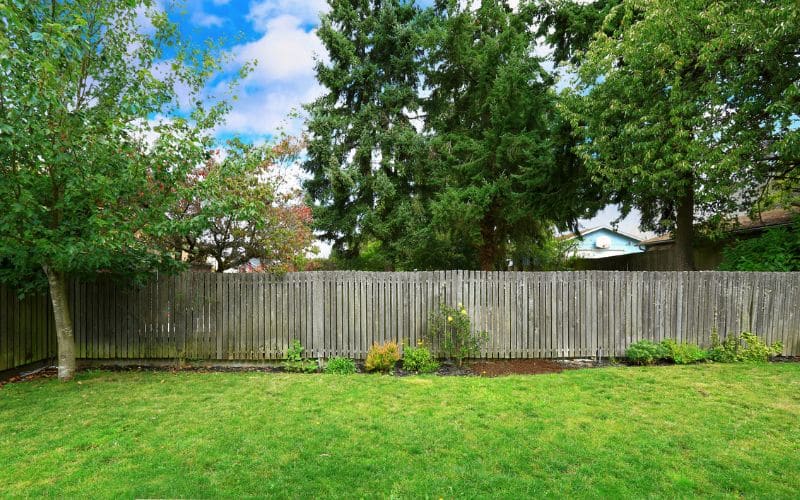
Noise pollution is a bugbear for many homeowners, especially those living close to highways. The constant hum of traffic can disrupt your peaceful time in the garden and make it harder to unwind. But don’t worry, there are ways to reduce highway noise in your backyard, transforming it into a tranquil haven.
You could be thinking about converting an inner corner of your yard into a noise-free retreat, or maybe you’re contemplating adding an enclosure like a pergola or gazebo. Perhaps you’re even considering more substantial architectural changes to your home. Whatever your thoughts, we’re here to guide you through the options, helping you weigh up the effort and cost involved.
From noise reduction landscaping to acoustical architectural measures, there are a range of solutions available. Whether it’s erecting a brick wall or implementing water features, we’ll show you how to combat exterior noise effectively. So, get ready to reclaim your backyard from the hustle and bustle of the highway.
Understanding the Problem
What is Highway Noise?
When thinking about highway noise, it’s crucial to grasp the wide range of sounds that contribute to this pervasive issue. From the relentless hum of tyres against tarmac to the sharp honk of horns and the rattle of large vehicles, highway noise is a complex symphony of sounds that can disrupt the tranquillity of your backyard.
Several factors influence the level and intensity of highway noise that reaches your home. These include:
- The volume of traffic
- The type of vehicles on the road
- The speed at which they’re travelling
- The distance from your home to the highway
Impact of Highway Noise on Backyard
Highway noise doesn’t just disturb the peace and quiet. It can also have a significant impact on your quality of life and property value. Research shows that consistent exposure to high noise levels can lead to a range of health problems, including sleep disturbances, cardiovascular issues and stress-related illnesses.
Furthermore, highway noise can diminish your enjoyment of your outdoor space. It becomes challenging to relax, entertain or even carry on a conversation when the noise level is too high. This can, in turn, reduce the appeal and value of your property.
While it may seem like a daunting problem, there are several practical steps you can take to reduce highway noise in your backyard. From noise reduction landscaping and building walls to installing water features, these solutions can transform your noisy backyard into a peaceful haven. And while some require a significant investment of time and money, the payoff in terms of improved quality of life and property value can be considerable.
Assessing the Noise Level
Before you dive into noise reduction strategies, it’s crucial to start by assessing the noise level in your backyard. You need to understand the extent of the problem and identify the sources of the noise. This preliminary step is key to devising an effective solution.
Determining the Current Noise Level
To gauge the current noise level, you might want to consider using a sound level meter. These devices can provide you with an accurate measure of the decibel level in your backyard. They’re readily available and easy to use. Just ensure you take readings at different times of the day and week.
You should also pay attention to the noise during different weather conditions. Noise can travel further in cold weather and wind can carry noise to places it wouldn’t normally reach.
Identifying the Noise Sources
Pinpointing the sources of noise is equally important. While the highway might be the obvious culprit, you might find that some noise is coming from other sources. This could be a nearby industrial site, railway line or even a local airport.
By identifying these additional noise sources, you can tailor your noise reduction strategy more effectively. You’ll know where to place barriers or landscaping features for maximum effect.
Remember, the goal here isn’t to eliminate every single noise. Instead, you’re trying to reduce the overall noise level to a point where it’s no longer intrusive. With careful assessment, you can transform your noisy backyard into a tranquil oasis. Just keep in mind that this process might take time and there might be some trial and error involved.
Take your time, assess the situation correctly, and you’ll be on your way to a more peaceful backyard environment. Soon, you’ll be able to enjoy your outdoor space without the constant hum of highway noise.
Planning and Designing the Backyard
To combat the incessant drone of highway noise, a well-thought-out plan and design for your backyard can be an effective solution. This process combines the use of physical barriers, innovative home improvements, and strategic landscaping to create a serene outdoor environment.
Creating a Barrier with Fences and Walls
Stand between the noise and your peaceful backyard with a solid, well-constructed barrier. Fences and walls are practical options that can reduce highway noise significantly. The trick is to install a barrier that’s high enough to break the direct path of sound waves.
- Opt for materials that are dense and massy, such as brick or stone, as they’re the most effective at blocking sound.
- Remember, the higher the wall or fence, the better it will be at blocking noise.
These barriers are not only functional but also add to the aesthetic appeal of your outdoor space.
Installing Soundproof Windows and Doors
Another approach to consider is improving your home’s resistance to external noise. Soundproof windows and doors are an excellent investment to achieve this. They work by creating a buffer between the inside of your home and the outside noise.
- Soundproof windows usually feature double or triple-pane glass, which reduces noise transmission.
- Soundproof doors, on the other hand, are solid-core and have additional insulation to act as a noise damper.
Installing these features will not only reduce noise but also improve your home’s energy efficiency.

Using Landscaping and Vegetation as Sound Absorbers
Lastly, don’t underestimate the power of nature in your battle against highway noise. Landscaping and vegetation effectively absorb and deflect sound waves.
- Plant rows of trees or tall shrubs along the perimeter of your property. They’ll act as a natural sound barrier.
- Incorporate a variety of plants at different heights to further diffuse noise.
Creating a tranquil backyard in the face of persistent highway noise can be a challenge. But, with the right planning and design, it’s entirely achievable. And remember, the goal isn’t to completely eliminate noise but to reduce it to a level that allows you to enjoy your outdoor space.
Implementing Noise Reduction Measures
Reducing highway noise in your backyard isn’t just about constructing walls or planting trees. It’s a process that requires a comprehensive approach. By making a few adjustments to your existing structures or incorporating sound masking devices, you can create a peaceful and quiet outdoor space.
Adding Soundproofing Materials to Existing Structures
One effective method to reduce noise in your backyard is by adding soundproofing materials to your existing structures. This could mean upgrading your fences, walls, or even your home’s doors and windows.
You may want to consider using dense materials like brick or stone for your walls and fences. These materials are excellent at blocking sound waves. For your doors and windows, consider installing soundproof versions. These are specially designed to reduce noise transmission, making your home and backyard a tranquil oasis, even if it’s next to a busy highway.
Using White Noise and Sound Masking Devices
You’ve probably heard of white noise machines to help you sleep at night, but did you know they can also help mask outdoor noise? These devices generate a steady, unobtrusive noise that can effectively mask unwanted sounds, like the hum of highway traffic.
Outdoor sound masking systems are waterproof, durable, and specifically designed to withstand the elements. You can discreetly install them throughout your backyard to create a sound blanket that masks intrusive noise. This way, you’ll be able to enjoy your outdoor spaces without the constant reminder of the bustling world outside.
Installing Acoustic Panels or Soundproof Curtains
For an additional layer of sound reduction, you might want to install acoustic panels or soundproof curtains. These items can absorb sound waves and decrease the noise level in your backyard.
Acoustic panels are often used in recording studios for their sound-absorbing properties, but they can be just as effective in residential settings. You can install them on your fences or walls to help dampen noise.
On the other hand, soundproof curtains are a flexible and aesthetically pleasing option. They are made of dense, noise-absorbing materials, and you can hang them around your patio or gazebo to create a quiet, cosy outdoor space.
Remember, reducing highway noise in your backyard is all about layering different noise reduction measures. By combining these strategies, you’ll be well on your way to creating a serene and peaceful outdoor environment, no matter how close you are to the highway.

Maintenance and Ongoing Solutions
Taking the first steps towards reducing highway noise in your backyard is certainly an accomplishment. Yet, it’s crucial to understand that maintaining tranquillity is an ongoing process. To ensure your noise reduction strategies continue to be effective, it’s essential to regularly inspect and maintain your soundproofing measures. Additionally, exploring further noise reduction options can provide additional benefits.
Regular Inspection and Maintenance of Soundproofing Measures
The key to long-term noise reduction lies in the regular inspection and maintenance of your soundproofing measures. Soundproof fences and walls made of dense materials like brick or stone need to be checked for cracks or damage that could let sound through. Similarly, soundproof windows and doors must be inspected for any leaks or gaps that might compromise their sound-blocking capabilities.
If you’ve incorporated landscaping and vegetation as natural sound barriers, remember, they also require ongoing care. Trees and tall shrubs need to be pruned and maintained regularly to ensure they continue to act effectively against noise.
Exploring Additional Noise Reduction Options
Although you’ve taken significant steps to reduce highway noise, it’s always a good idea to explore additional options. Depending upon the severity of the noise and your personal preferences, you might want to consider further solutions.
Soundproofing materials can be added to existing structures to enhance their noise-blocking capabilities. White noise devices and sound masking techniques can be useful in drowning out persistent highway noise. If you spend a lot of time indoors, consider installing acoustic panels or soundproof curtains to further reduce noise transmission.
Remember, the goal is to create and maintain a tranquil environment in your backyard. So, don’t hesitate to explore additional solutions that might help you achieve this. By continually maintaining your soundproofing measures and staying open to new noise reduction options, you’ll be able to enjoy a peaceful backyard experience, no matter how busy the nearby highway is.
Conclusion
You’ve now got the tools to tackle that pesky highway noise in your backyard. With careful planning and design, you can create a serene outdoor space. Remember, dense materials like brick or stone for fences and walls can be your first line of defence. Don’t forget about soundproof windows and doors too.
Landscaping and vegetation are not just for aesthetics; they’re natural sound barriers as well. Maintain these measures with regular checks and care. And if you’re still hearing too much noise, don’t despair. There are more options to explore like soundproofing materials, white noise devices, and acoustic panels or curtains.
Reducing highway noise to a manageable level isn’t just about peace and quiet. It’s about reclaiming your outdoor space and making it a tranquil haven. So go ahead, implement these tips and enjoy the silence.








